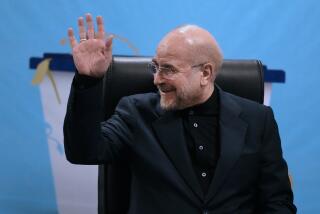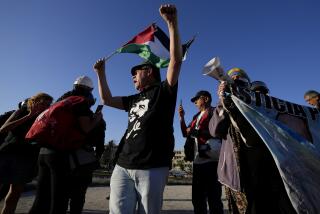Constitution Is Put Before a Divided Iraq
- Share via
BAGHDAD — Iraqis walked by the millions to vote today as Shiite Muslim leaders mobilized followers for a massive show of support for a draft constitution, despite continued opposition among angry but increasingly divided Sunnis.
Polling stations opened at 7 a.m., hours after insurgents sabotaged power lines in the northern part of the country, plunging the capital into darkness and cutting off water supplies.
Voters ventured early into the streets of Iraqi cities -- guarded by Iraqi security forces who banned private cars -- to schools where polling stations were fortified with concrete barriers against possible attacks by Sunni-led insurgents determined to sabotage the vote.
Police reported one deadly insurgent attack today: a roadside bombing that killed three Iraqi soldiers near the Iranian border a few hours before the polls opened.
“I expect good things for the people for this constitution,” said Ali Kadhem Abed, a petite 52-year-old woman wearing a black abaya, after voting in Bayaa, a Shiite district of the capital. “It will bring peace and stability.”
In the northern city of Kirkuk, Hamid Abdul Jabbar, a 35-year-old Sunni, said he voted against the charter. “It does not represent the Iraqi Sunnis,” he said. “It will lead to the division of Iraq.”
President Jalal Talabani and Prime Minister Ibrahim Jafari were among the first to vote in Baghdad’s heavily fortified Green Zone, headquarters of a government elected in January and led by a coalition of Shiites and Kurds. Both had urged a “yes” vote.
Many of those casting early ballots voiced enthusiasm over Iraq’s second nationwide vote since the ouster of President Saddam Hussein 2 1/2 years ago. Amar Sadhel Kifajy, a Shiite voter in Baghdad, called it a festive occasion, “like a wedding celebration.”
“I made sure my whole family came with me, even though they are fasting for Ramadan,” Nassera Abaas, a 60-year-old housewife, said amid a heavy turnout in Baghdad’s heavily Shiite district of Sadr City. “It’s important to taste the freedom we were deprived of for so long.”
Sunnis were divided on the charter but turned out in significant numbers in Samarra, Fallouja and other cities that heavily boycotted the January election.
Ahmed Mohammad Mahmoud, a 30-year-old electronics engineer in Samarra, said Shiite leaders who helped shape the document were intent on creating an autonomous pro-Iranian Shiite mini-state in southern Iraq that would “hand Iraq to the Iranians on a gold platter.”
“This constitution is for the people who wrote it, not for us,” Mohammed Kadhim, a 50-year-old high school teacher, said after voting in Fallouja.
But Mohammed Aboudi, a 38-year-old Sunni in Baghdad, voted for the charter, saying it would lead the country to a more stable democracy, undermine the insurgency and “build a clear future, free of occupation” by U.S. troops.
On Friday, militants attacked five offices of the Iraqi Islamic Party, the prominent Sunni group that agreed to back the charter in exchange for last-minute concessions. Rebels bombed its office in Baghdad and set fire to its headquarters in Fallouja. No one was injured.
Armed men also launched simultaneous attacks on four Baghdad polling centers Friday night and sabotaged power lines.
Today’s vote follows months of grueling negotiations among Sunni Arabs, Shiites and Kurds that were often centered on Iraq’s identity as a nation. Until this week, Sunni Arabs, who were underrepresented in the interim government because many refused to participate in the Jan. 30 parliamentary election, were set to vote against the proposed charter en masse because they believe it mandates a weak central government and fails to uphold Iraq’s Arab character.
But under heavy U.S. pressure, the proposed constitution was amended this week to open a four-month window for more changes next year. That persuaded the Iraqi Islamic Party to sign on. A smattering of other Sunnis followed suit, including the head of the Sunni Endowment, a government agency that looks after the sect’s mosques.
Opponents of the constitution, who need a two-thirds no vote in at least three provinces, face an uphill battle. Sunnis constitute the majority in three provinces but are dominant in only two. The Iraqi Islamic Party’s decision has persuaded some to support the constitution, but many other Sunnis consider the move a betrayal.
A radical insurgent group, the Army of the Victorious Sect, posted an Internet message calling the leaders of the Islamic Party apostates and threatened to kill them, Arab satellite television stations reported. At the Abu Hanifa shrine in Baghdad, among the most important Sunni sites in Iraq, worshippers demonstrated before Friday prayers. They held a banner that read: “No to the constitution. No to the occupation. No to deceiving the people.”
Still, Sunni clerics tempered their calls for “no” votes with appeals for dialogue and calm.
“Our opinion is to reject the constitution, but in spite of that we must understand the points of view of others,” Sheik Mahmoud Sumaidaie told attendees of Friday prayers at the Umm Qura Mosque, a Sunni place of worship. “But those threatening bloodshed shouldn’t do that. We should not consider others infidels just for their opinions and not kill others for their opinions.”
Arab nationalists and former members of Saddam Hussein’s Baath Party vehemently condemned the Iraqi Islamic Party’s support for the charter, publicly denouncing its leaders as U.S. lackeys and predicting that Sunnis would ignore their calls.
“They came with the occupier. They were carried in by American tanks,” said Saadoun Zubaidi, a member of the National Dialogue Council, an Arab nationalist group. “They have no grass roots and have a leadership that is under the control of money and the occupier. The Arabs of Iraq are not going to be deceived by a few people who are known to have worked for outside forces.”
Islamic Party leaders acknowledged the rifts caused by their change of position but predicted that the damage would be repaired and Sunni factions would coalesce again in time for a new parliamentary election Dec. 15.
“This will not start civil war between the Sunnis, but people will need time to understand the essence of issues, and then they will calm down,” said Ayad Samaraii, a leader of the party, who blamed the attacks on his group’s offices on former Baathists.
Few Iraqis or Western observers believe that the charter, crafted largely by Iraq’s majority Shiites and Kurds, will be defeated. “It’s conceivable that there could be a no vote,” said a Baghdad-based official with a Western government that supports the constitution. “But I’m going to sleep well tonight.”
“The constitution after the amendments became more balanced and fair,” said Iyman Abed Rahman, a Sunni lawyer from the northern city of Mosul. “Its acceptance by the Iraqi Islamic Party assures us that it does not contradict the laws of Islam. This gave me more courage to make my decision.”
As they did in January, Iraq’s Shiites sought to leverage the influence of clerics in the holy city of Najaf, especially the revered Grand Ayatollah Ali Sistani, to draw masses of his followers to the polls.
“Ayatollah Sistani has issued a fatwa to participate in the referendum and has preferred a ‘yes’ vote,” Sheik Abdul Mehdi Karbalai, a Sistani deputy, told Shiite worshippers Friday in Karbala, also sacred to the sect.
Officials expect a high turnout. In a poll conducted by the International Republican Institute, which is led by prominent U.S. Republican Party members, 87% of Iraqis questioned said they planned to vote. In Sunni areas, where violence and calls for a boycott depressed the January election’s turnout, 83% said they would participate.
The Western official, a seasoned political advisor in Iraq who spoke to journalists on condition of anonymity, said he expected turnout to top 50% even in volatile Al Anbar province, which includes such hotspots as Ramadi and Fallouja.
About 15.5 million people are registered to vote at one of 6,230 polling centers throughout the country. The first ballots were cast Thursday by Iraqi prisoners around the country, as well as doctors and hospital patients.
Iraq police and soldiers were assigned to protect voting sites, with U.S. forces ready to respond to possible violence, said Army Maj. Gen. Rick Lynch.
In the Kurdish north, voters appeared eager to approve the constitution, which enshrines guarantees for their federal region and recognizes them as a distinct minority.
“It guarantees our human rights as Kurds after they were taken from us for so long during the brutal regime of Saddam Hussein,” said Ardanal Murad Jaff, a contractor in Sulaymaniya. “Therefore, like all Kurds, I will vote ‘yes.’ ”
Times staff writers Shamil Aziz, Raheem Salman and Saif Rasheed in Baghdad, special correspondents Ali Windawi in Kirkuk and Saad Fakhrildeen in Najaf and a special correspondent in Mosul contributed to this report.
More to Read
Sign up for Essential California
The most important California stories and recommendations in your inbox every morning.
You may occasionally receive promotional content from the Los Angeles Times.













